Events
2004
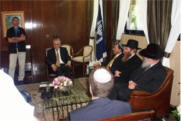 Israeli President Moshe Katzav received a delegation of rabbis
brought by JICI to discuss their Religious Peacemaking in
the Middle East initiative, and expressed his support. Israeli President Moshe Katzav received a delegation of rabbis
brought by JICI to discuss their Religious Peacemaking in
the Middle East initiative, and expressed his support.
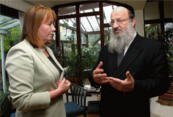 At a public reception held by the JICI in London, Baroness
Symons, Minister of State at the UK Foreign Office, also expressed
her "heartfelt support" of the Religious Peacemaking initiative. At a public reception held by the JICI in London, Baroness
Symons, Minister of State at the UK Foreign Office, also expressed
her "heartfelt support" of the Religious Peacemaking initiative.
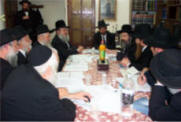 A groundbreaking point is reached at JICI's Public Policy
Research Department with the establishment of a Rabbinical
Steering Committee (click for
more information), composed of preeminent rabbis representing
all main sections of Haredi society, and closely associated
with leading Torah Sages. A groundbreaking point is reached at JICI's Public Policy
Research Department with the establishment of a Rabbinical
Steering Committee (click for
more information), composed of preeminent rabbis representing
all main sections of Haredi society, and closely associated
with leading Torah Sages.
Jewish Solidarity: Antidote to Assimilation,a
selection of Rabbi jakobovits' writings in English, is published
by the JICI.
A $35,000 grant is received from the Avi Chai Foundation
in support of the Institute’s activities.
2003
Major preparations are made for the opening of the Center
for Halachic Research on Contemporary Issues, including
enlistment of senior research fellows, setting up a curriculum,
and operational budget.
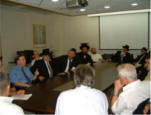 Ongoing, thorough and wide-ranging dialogue proceeds in the
framework of the Yachad Council, especially regarding
organ transplants and life prolongation, and the Two Communities
– One People Proposal. This includes a first annual Jerusalem
Conference on religious-secular relations and an important JICI
initiative: a first-time Rabbis and Medical Doctors Seminar,
bringing together key rabbinical and medical figures in Israel,
including the directors of major medical centers, the Chief
Scientist at the Ministry of Health, and others. The background
to this seminar is the lack of organ donors and a long-term
crisis of credibility between the medical establishment and
the highest halachic authorities. Ongoing, thorough and wide-ranging dialogue proceeds in the
framework of the Yachad Council, especially regarding
organ transplants and life prolongation, and the Two Communities
– One People Proposal. This includes a first annual Jerusalem
Conference on religious-secular relations and an important JICI
initiative: a first-time Rabbis and Medical Doctors Seminar,
bringing together key rabbinical and medical figures in Israel,
including the directors of major medical centers, the Chief
Scientist at the Ministry of Health, and others. The background
to this seminar is the lack of organ donors and a long-term
crisis of credibility between the medical establishment and
the highest halachic authorities.
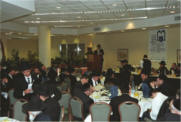 A seminar is held on The Tension Between the Haredi and
the Secular Populations in Israel – as an Existential Danger,
with the participation of Rabbi Shmuel Jakobovits, Rabbi Yeheskel
Weinfeld, Major-General Uzi Dayan, and a large-numbered delegation
of members of Agudath Israel of America. A seminar is held on The Tension Between the Haredi and
the Secular Populations in Israel – as an Existential Danger,
with the participation of Rabbi Shmuel Jakobovits, Rabbi Yeheskel
Weinfeld, Major-General Uzi Dayan, and a large-numbered delegation
of members of Agudath Israel of America.
2002
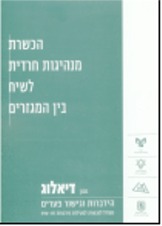 Rabbi Jakobovits initiates and helps run a training course
to prepare young Torah leaders for Inter-Communal Dialogue;
in cooperation with Manof, a division of Arachim. The course
trains 45 outstanding young leaders in its first year. Rabbi Jakobovits initiates and helps run a training course
to prepare young Torah leaders for Inter-Communal Dialogue;
in cooperation with Manof, a division of Arachim. The course
trains 45 outstanding young leaders in its first year.
A $30,000 grant is received from the Avi Chai Foundation
to fund part of the Institute’s activities.
2001
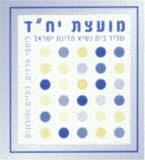 Rabbi Jakobovits plays a decisive role in the establishment
of the Yachad Council and its installation as an affiliate
of Beit Hanassi (the Israeli President’s House). The council,
which is comprised of prominent members, meets regularly to
discuss issues affecting modern life in Israel, including archeology,
Sabbath observance, and organ transplants. The council is making
steady progress toward resolution of these and other issues. Rabbi Jakobovits plays a decisive role in the establishment
of the Yachad Council and its installation as an affiliate
of Beit Hanassi (the Israeli President’s House). The council,
which is comprised of prominent members, meets regularly to
discuss issues affecting modern life in Israel, including archeology,
Sabbath observance, and organ transplants. The council is making
steady progress toward resolution of these and other issues.
2000
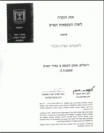 Ura Kevodi, the Institutes’ founding association, receives
the Year 2000 Award for Promotion of Secular-Religious Dialogue
from the speaker of the Knesset and the Minister of Israeli
Society and the Diaspora. Ura Kevodi, the Institutes’ founding association, receives
the Year 2000 Award for Promotion of Secular-Religious Dialogue
from the speaker of the Knesset and the Minister of Israeli
Society and the Diaspora.
Rabbi Jakobovits participates in the formulation of a government
decision regarding the establishment of the Yachad Council for
Secular-Religious Relations.
Institute’s associates initiate efforts to increase education
on Good Manners and Respectful Behavior (derech eretz) within
the Ultra Orthodox community on the elementary school level.
1999
Rabbi Shmuel Jakobovits, Dean of the Institute, participates
in the establishment and running of a forum entitled Toward
National Consensus. The forum is attended by 400 people
of diverse backgrounds who discuss issues of joint concern.
The forum advances a number of initiatives aimed at reducing
inter-sectoral conflict in Israel.
1998
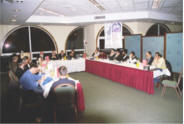 A Conference of Torah Thinkers (Ve’idat Anshei Torah)
is established to examine the Challenges Facing The
Jewish Community In Modern Times. The conference, comprised
of 25 leading educators, meets on an ongoing basis. A Conference of Torah Thinkers (Ve’idat Anshei Torah)
is established to examine the Challenges Facing The
Jewish Community In Modern Times. The conference, comprised
of 25 leading educators, meets on an ongoing basis.
The Dialogue between Worlds project is established
in Jerusalem in cooperation with the Van Leer Institute.
1997
A conference of senior halachists is held regarding the topic
Extending life. The conference is attended by 25 leading
Jewish scholars, including Rav Zalman Nechemiah Goldberg, Rav
Avigdor Nebentzal, and Rav Shmuel Eliezer Stern, a member Rav
Wosner’s Beit Din.
1995
A conference is held under the auspices of the Jerusalem
municipality involving intellectuals from the Torah community
on the topic: Is dialogue possible in Jerusalem? Some
120 people attend, with Rabbi Shlomo Wolbe and Mayor Ehud Olmert
addressing the conference.
1994
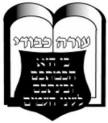 Ura Kevodi is founded as the Charedi Association for the
Study of Contemporary Issues, with the ultimate aim of creating
the Harav Lord Jakobovits Torah Institute of Contemporary
Issues. Ura Kevodi is founded as the Charedi Association for the
Study of Contemporary Issues, with the ultimate aim of creating
the Harav Lord Jakobovits Torah Institute of Contemporary
Issues.
1987
Reacting to public furor over a sharp rise in haredi power
in an Israeli election, Rabbi Shmuel Jakobovits initiates a
groundbreaking effort to evaluate the feasibility of haredi-secular
intellectual dialogue. His paper written in this connection
on The Normative Haredi Attitude to the State of Israel
is greeted with skepticism by non-haredim, but with general
confirmation by haredi Torah scholars and leaders, most notably
by the leading Torah sage, the late Rabbi Shach, of blessed
memory.
|




 Israeli President Moshe Katzav received a delegation of rabbis
brought by JICI to discuss their
Israeli President Moshe Katzav received a delegation of rabbis
brought by JICI to discuss their  At a public reception held by the JICI in London, Baroness
Symons, Minister of State at the UK Foreign Office, also expressed
her "heartfelt support" of the Religious Peacemaking initiative.
At a public reception held by the JICI in London, Baroness
Symons, Minister of State at the UK Foreign Office, also expressed
her "heartfelt support" of the Religious Peacemaking initiative.
 A groundbreaking point is reached at JICI's Public Policy
Research Department with the establishment of a Rabbinical
Steering Committee (
A groundbreaking point is reached at JICI's Public Policy
Research Department with the establishment of a Rabbinical
Steering Committee ( Ongoing, thorough and wide-ranging dialogue proceeds in the
framework of the Yachad Council, especially regarding
organ transplants and life prolongation, and the Two Communities
– One People Proposal. This includes a first annual Jerusalem
Conference on religious-secular relations and an important JICI
initiative: a first-time Rabbis and Medical Doctors Seminar,
bringing together key rabbinical and medical figures in Israel,
including the directors of major medical centers, the Chief
Scientist at the Ministry of Health, and others. The background
to this seminar is the lack of organ donors and a long-term
crisis of credibility between the medical establishment and
the highest halachic authorities.
Ongoing, thorough and wide-ranging dialogue proceeds in the
framework of the Yachad Council, especially regarding
organ transplants and life prolongation, and the Two Communities
– One People Proposal. This includes a first annual Jerusalem
Conference on religious-secular relations and an important JICI
initiative: a first-time Rabbis and Medical Doctors Seminar,
bringing together key rabbinical and medical figures in Israel,
including the directors of major medical centers, the Chief
Scientist at the Ministry of Health, and others. The background
to this seminar is the lack of organ donors and a long-term
crisis of credibility between the medical establishment and
the highest halachic authorities.  A seminar is held on The Tension Between the Haredi and
the Secular Populations in Israel – as an Existential Danger,
with the participation of Rabbi Shmuel Jakobovits, Rabbi Yeheskel
Weinfeld, Major-General Uzi Dayan, and a large-numbered delegation
of members of Agudath Israel of America.
A seminar is held on The Tension Between the Haredi and
the Secular Populations in Israel – as an Existential Danger,
with the participation of Rabbi Shmuel Jakobovits, Rabbi Yeheskel
Weinfeld, Major-General Uzi Dayan, and a large-numbered delegation
of members of Agudath Israel of America. Rabbi Jakobovits initiates and helps run a training course
to prepare young Torah leaders for Inter-Communal Dialogue;
in cooperation with Manof, a division of Arachim. The course
trains 45 outstanding young leaders in its first year.
Rabbi Jakobovits initiates and helps run a training course
to prepare young Torah leaders for Inter-Communal Dialogue;
in cooperation with Manof, a division of Arachim. The course
trains 45 outstanding young leaders in its first year.
 Rabbi Jakobovits plays a decisive role in the establishment
of the Yachad Council and its installation as an affiliate
of Beit Hanassi (the Israeli President’s House). The council,
which is comprised of prominent members, meets regularly to
discuss issues affecting modern life in Israel, including archeology,
Sabbath observance, and organ transplants. The council is making
steady progress toward resolution of these and other issues.
Rabbi Jakobovits plays a decisive role in the establishment
of the Yachad Council and its installation as an affiliate
of Beit Hanassi (the Israeli President’s House). The council,
which is comprised of prominent members, meets regularly to
discuss issues affecting modern life in Israel, including archeology,
Sabbath observance, and organ transplants. The council is making
steady progress toward resolution of these and other issues. Ura Kevodi, the Institutes’ founding association, receives
the Year 2000 Award for Promotion of Secular-Religious Dialogue
from the speaker of the Knesset and the Minister of Israeli
Society and the Diaspora.
Ura Kevodi, the Institutes’ founding association, receives
the Year 2000 Award for Promotion of Secular-Religious Dialogue
from the speaker of the Knesset and the Minister of Israeli
Society and the Diaspora. A Conference of Torah Thinkers (Ve’idat Anshei Torah)
is established to examine the Challenges Facing The
Jewish Community In Modern Times. The conference, comprised
of 25 leading educators, meets on an ongoing basis.
A Conference of Torah Thinkers (Ve’idat Anshei Torah)
is established to examine the Challenges Facing The
Jewish Community In Modern Times. The conference, comprised
of 25 leading educators, meets on an ongoing basis.  Ura Kevodi is founded as the Charedi Association for the
Study of Contemporary Issues, with the ultimate aim of creating
the Harav Lord Jakobovits Torah Institute of Contemporary
Issues.
Ura Kevodi is founded as the Charedi Association for the
Study of Contemporary Issues, with the ultimate aim of creating
the Harav Lord Jakobovits Torah Institute of Contemporary
Issues.